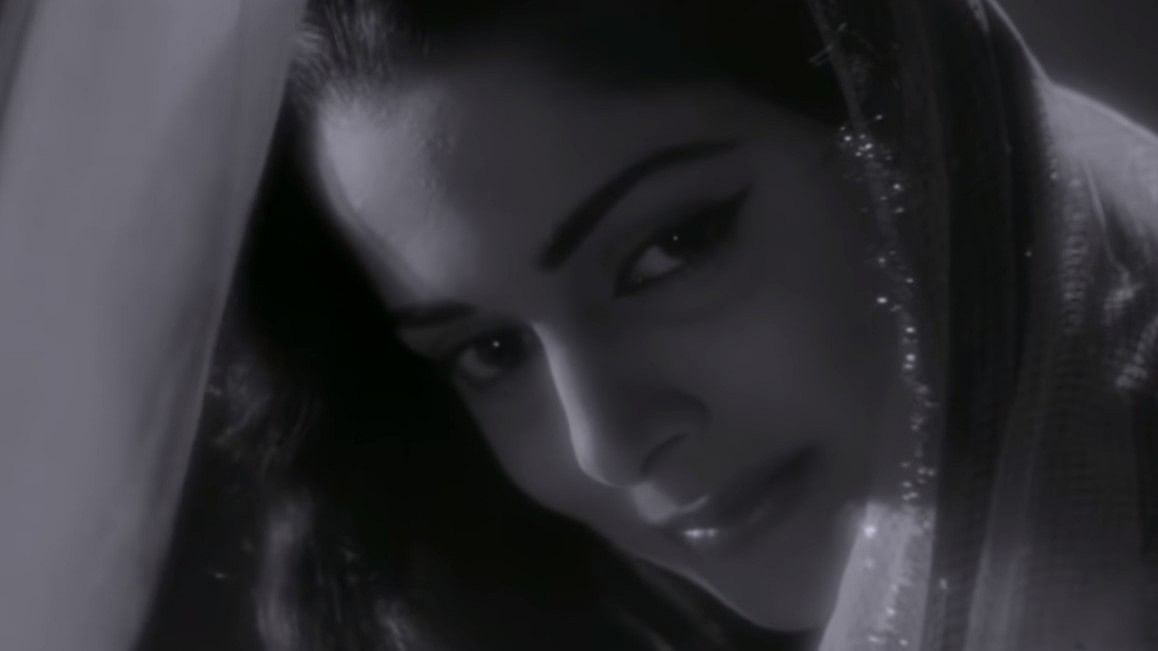
Waheeda Rehman in Chaudvin ka Chand'.
Credit: Special Arrangement
Vijay, a penniless, heartbroken and idealistic Urdu poet, is appalled to find his file of poems missing — his brothers have sold it off as waste paper. He goes looking for it and finds out they are now in the possession of a woman. He sits on a park bench, and the silhouette of a woman starts singing one of his poems. When he calls for her, she mistakes him for a prospective client — Waheeda Rehman plays the role of Gulabo, a sex worker — and tries to entice him: Jaane kya tune kahi, jaane kya maine suni, baat kuch ban hi gayi… (‘Who knows what you said? Who knows what I heard? Something stirred in my heart…). She drives him away when she finds out he has no money.
That was my first glimpse of Waheeda Rehman. Pyaasa (1957, dir: Guru Dutt) is one of my most favourite films. When the V K Murthy retrospective was announced at the Bengaluru International Film Festival (BIFFes) last year, Pyaasa was one of the films I wanted to catch on the big screen. My friends and I waited in a queue for two hours to catch it, with others there to watch it for the first time.
Guru Dutt's 'Pyaasa' was Waheeda's first film as a lead actor.
Credit: Special Arrangement
Another scene in Pyaasa underlines Waheeda Rehman’s beauty. She meets Vijay (Guru Dutt) for the second time — by now she has realised that he is the man whose poems she adores — she is in love with him and shyly sits beside him. The dialogues that follow are pure and heart wrenching. She expresses surprise at the respect he shows her and tells him how she is generally ill-treated by her clients. Her character is based on a real life person called Gulabo who Abrar Alvi, the script writer, met in Mumbai’s red light area. Gulabo had thanked Alvi, saying this was the first time someone had been generous to her.
For those of us in our 20s, It was a delight to watch the film on the big screen. I was also lucky enough to get a glimpse of the song Tere mere sapne, ab ek rang hai… (with Waheeda and Dev Anand against an orange sunset) when Guide (1964, dir: Vijay Anand) was screened at the International Film Festival of India (IFFI) in 2021.
Waheeda played memorable roles, as I discovered in the course of my exploration. Besides playing the heroine in a number of films, she also experimented with supporting roles — from playing mother to Jaya Bachchan in Phagun (1975) to Abhishek Bachchan’s grandmother in Delhi-6 (2009). The range and the versatility make her deserving of the highest honour in Indian cinema, the ‘Dadasaheb Phalke Award’, given for lifetime achievement.
Her life
Waheeda Rehman was born in a Dakhni Muslim family in Chengalpet (present day Tamil Nadu), on February 3, 1938. She debuted with the Telugu film Rojulu Marayi in which she appeared as a dancer in a song. She then played the lead opposite NTR in the Telugu film Jayasimha in 1955. Her Hindi cinema breakthrough was with the film CID (1956) in which she played the antagonist, alongside Dev Anand. Her collaboration with Guru Dutt resulted in a number of cult classics like Pyaasa, Kaagaz Ke Phool, Chaudvin Ka Chand, and Sahib Bibi aur Ghulam.
Waheeda played an assailant in ‘12 O’Clock’, a film star in Kaagaz Ke Phool, an idealist in Kala Bazar, a murder suspect in Baat Ek Raat Ki, a nurse in Khamoshi, and a clanswoman in Reshma Aur Shera, the last of which got her a National award for acting. In the 2017 film The Song of Scorpions (dir: Anup Singh), Waheeda plays a Rajasthani scorpion singer (nomadic tribe who sing songs to counter the poison of the scorpion sting) in the deserts of Rajasthan, alongside Irrfan Khan and Iranian actor Golshifteh Farahani.
The actor plays the role of a scorpion singer in 'The Song of Scorpions'.
Credit: Special Arrangement
Her collaboration with Dev Anand brought in a number of successful films. She received critical acclaim for her performance in Solva Saal (1958). Guide, based on an R K Narayan novel, is considered ahead of its times for the strong portrayal of the protagonist, Rosie (Waheeda Rehman).
She also ventured into Bengali cinema with Satyajit Ray’s Abhijan (1962), in which she plays a melancholic village widow.
She started appearing in supporting roles in the ’70s in films like ‘Kabhi Kabhie’ (1976), ‘Trishul’ (1978), ‘Namkeen’ (1982), ‘Namak Halaal’ (1982), ‘Coolie’ (1983), ‘Mashaal’ (1984), ‘Chandni’ (1989) and ‘Lamhe’ (1991), among others.
I discovered old Hindi films through my grandfather. A few years after his retirement, my uncle got home a DVD player and my grandfather used it to the fullest. He would bring DVDs of old Hindi films and watch them. I joined him on many occasions. He is a fan of Waheeda Rehman, I guess most men of the time were mesmerised by her beauty. Once while we were watching the title track of Chaudhvin Ka Chand, I translated the lyrics to him. He didn’t quite understand poetry — the song translates to ‘are you the full moon or the dazzling sun? Whatever you are, I swear you are beyond comparison.’ He said the lyrics described her perfectly. My grandmother, who was listening to all this, said, “They’re not really so beautiful, it’s the make-up.” Women sure envied her!
Best performances of the actor
Pyaasa (1957)
Kaagaz Ke Phool (1959)
Kala Bazar (1960)
Sahib Bibi Aur Ghulam (1962)
Bees Saal Baad (1962)
Abhijan (1962)
Guide (1965)
Neel Kamal (1968)
Reshma Aur Shera (1971)
The Song of Scorpions (2017)